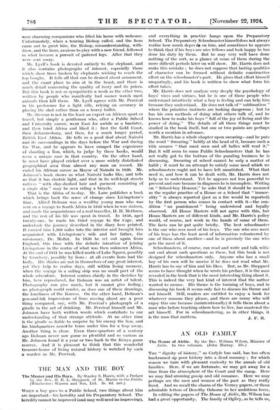THE MAN AND THE BOY
The Master and His Boys. By Stanley S. Harris, with a Preface by the Rev. H. R. L. Sheppard, of St. Martin•in-the-Fields. (Winchester : Warren and Son, Ltd. 3s. 6d. net.) WHEN a boy goes to a Public School, two things about him are important—his heredity and his Preparatory School. The heredity cannot be improved (and may well need no improving),
and everything in practice hangs upon the Preparatory School. The Preparatory Sehoohnasterhirnself does not always realize how much deper do on him, and sometimes he appears to think that if his boys are nice fellows and look happy he has done his duty by them. But he may very well have done nothing of the sort, as a glance at some of them during the more difficult periods later on will show. Mr. Harris does not make this mistake ; he does not suppose that lasting qualities of character can be formed without definite constructive effort on the schoolmaster's part. He gives that effort himself unsparingly, and his book is written to show what form his effort takes.
Mr. Harris does not analyze very deeply the psychology of boys' vices and virtues, but he is one of those people who understand intuitively what a boy is feeling and can help him because they understand. He does not talk of " sublimation where the primitive instincts are looking dangerous ; but he has his own methods of doing what others talk of, and he knows how to make his boys " full of the joy of living and the power of doing." The details of all these things must be studied in the book itself, but one or two points are perhaps worth a mention in advance.
Mr. Harris has a whole chapter upon swearing—and he puts the word " Swearing " boldly at the head of it, because such a title secures " that most men and all ladies will read it."
But it will seem to some Public Schoolmasters that he has not really got to the bottom of the puzzling business he is discussing. Swearing at school cannot be only a matter of habit ; it must be an attempt to satisfy some need which we schoolmasters ought not to have left unsatisfied. What that need is, and how it can be dealt with, Mr. Harris does not help us to understand. Yet he appears not less powerful to prevent and cure because in diagnosis he is incomplete. Writing on " School-boy Honour," he asks that it should be assumed as the regular practice of a House or a School that " immor- ality " is always reported (just as a fire would be reported) by the first person who comes in contact with it—the con- dition " no punishment " being understood and loyally observed. All House Masters will not agree with this, but House Masters are of different kinds, and Mr. Harris's policy would, of course, not work in the hands of some of them.
The facts can be put quite briefly. The best schoolmaster is the one who sees most of his boys. The one who sees most of his boys has the least need of information volunteered by one of them about another—and he is precisely the one who gets the most of it.
Schoolmasters, of course, can read and write and talk with- out end about such questions as these, but this book is not
designed for schoolmasters only. Anyone who has a small boy of his own will be unwise if he does not read what Mr. Harris has to say of him and his likes. But, as Mr. Sheppard seems to have thought when he wrote his preface, it is the man revealed in the book that is the most interesting thing about it. This is indeed the very last kind of interest that the author wanted to arouse. His theme is the training of boys, and in discussing his book it seems only fair to discuss his theme and not himself. Still, readers are entitled to enjoy a book for whatever reasons they please, and there are many who will enjoy this one because (unintentionally) it tells them about a man who before teaching others how to live, has mastered the art himself. For in schoolmastering, as in other things, it


















































 Previous page
Previous page